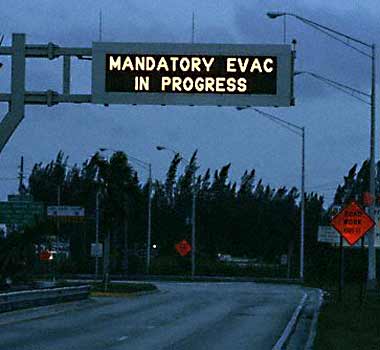Hurricane Wilma hits Florida

Your support helps us to tell the story
From reproductive rights to climate change to Big Tech, The Independent is on the ground when the story is developing. Whether it's investigating the financials of Elon Musk's pro-Trump PAC or producing our latest documentary, 'The A Word', which shines a light on the American women fighting for reproductive rights, we know how important it is to parse out the facts from the messaging.
At such a critical moment in US history, we need reporters on the ground. Your donation allows us to keep sending journalists to speak to both sides of the story.
The Independent is trusted by Americans across the entire political spectrum. And unlike many other quality news outlets, we choose not to lock Americans out of our reporting and analysis with paywalls. We believe quality journalism should be available to everyone, paid for by those who can afford it.
Your support makes all the difference.Wilma made landfall at 6:30am EDT (1030GMT) near Cape Romano, 35 kilometres south of Naples, bringing with it a potential 6-metre storm surge, the National Hurricane Center said.
Hurricane-force wind of at least 120 kph extended 145 kilometres from the centre and tropical storm-force winds reached 370 kilometres, the hurricane centre said. The storm strengthened in the hours before making landfall.
More than 22,600 people were in shelters across the state. But in the low-lying Florida Keys, not even 10 percent of the islands' 78,000 residents evacuated, Sheriff Richard Roth said.
That could prove to be a mistake: While Wilma did not make landfall over the Keys, the storm could bring a surge of 2.5 metres to sections of the low-lying island chain.
"They're going to be in deep trouble," warned Billy Wagner, the senior Monroe County emergency management director. Street flooding was reported in the Keys, while power outages were reported in both the Keys and along the southwest side of the state.
The fast-moving hurricane was next expected to slice northeast across the state at up to 40 kph, with the Atlantic Coast likely to get winds nearly as strong as those hitting the Gulf Coast.
"Less weakening should occur as compared to typical hurricanes moving over land," said forecaster Stacy Stewart of the hurricane centre. "Therefore, Wilma is expected to be a Category 2 hurricane when it reaches the Florida east coast."
Gov. Jeb Bush asked that Florida be granted a major disaster declaration for 14 counties. Many of the areas bracing for Wilma were hit by hurricanes in the past two years.
The National Guard was on alert, and state and federal officials had trucks of ice and food ready to deploy. The Federal Emergency Management Agency was poised to send in dozens of military helicopters and 13.2 million ready-to-eat meals if needed.
In Miami Lakes, as Wilma spun more than 240 kilometres away, the blue glow of transformers exploding illuminated the pre-dawn sky. Large signs marking exits on the Palmetto Expressway were already toppled by Wilma's gusts - which were only a tropical storm force at that time.
Wilma's arrival also was announced by at least four tornadoes - including one near Kennedy Space Center at Cape Canaveral - that caused some structural damage, but no injuries.
Wilma is Florida's eighth hurricane in 15 months and prompted the fourth evacuation of the Keys this year. It earlier battered the Mexican coastline with howling winds and torrential rains.
At least three people were killed in Mexico. Thirteen others died in Jamaica and Haiti, and four bodies were found off Cozumel, though it wasn't clear if they were killed by the storm.
In Cuba, massive waves churned by Wilma's outer bands crashed into Havana early today, flooding the Malecon coastal highway and seeping into nearby neighbourhoods of old, crumbling buildings.
Seawater penetrated Havana's coastal neighbourhoods up to four blocks in, with floodwaters reaching up to a metre in some places. Basement apartments were submerged.
The Cuban government had evacuated more than 625,000 people, mostly in the island's west.
Rainfall of up to 38 centimetres was possible in some parts of western Cuba, the National Hurricane Center in Miami said.
President Fidel Castro appeared on a television program to calm Cubans. The extent of damage in Cuba's north was still unknown.
Meanwhile, the remnants of Tropical Depression Alpha spun north away from the Bahamas today, toward open Atlantic waters. It was no threat to land, forecasters said. Alpha was the record-breaking 22nd named storm of the 2005 Atlantic season.
On Sunday, Alpha pounded Haiti and the Dominican Republic with torrential rains and winds, sending rivers crashing over their banks, washing away homes and tossing debris into the streets. At least one person was killed in Haiti.
In Europe, crude oil slipped below $60 as traders expected Wilma to avoid already battered Gulf of Mexico oil producing and refining facilities. At least four companies operating in the gulf shut down production platforms.
Join our commenting forum
Join thought-provoking conversations, follow other Independent readers and see their replies
Comments